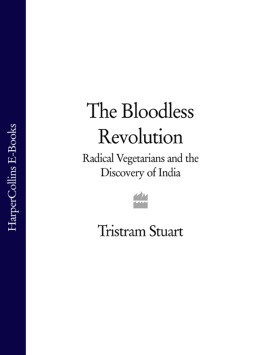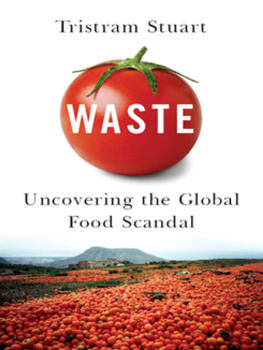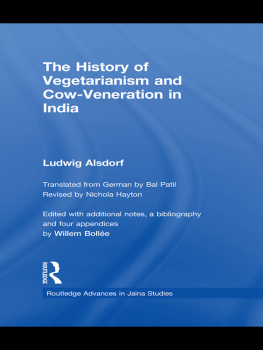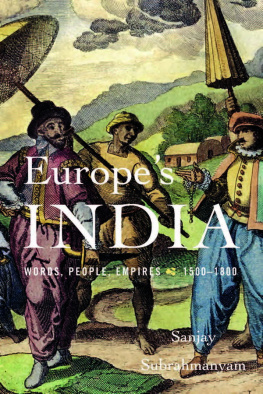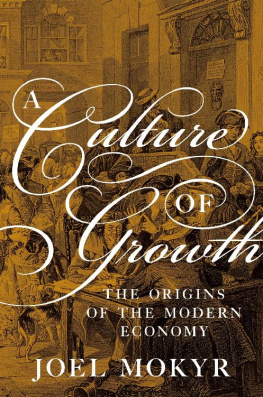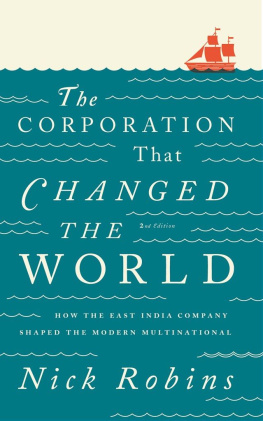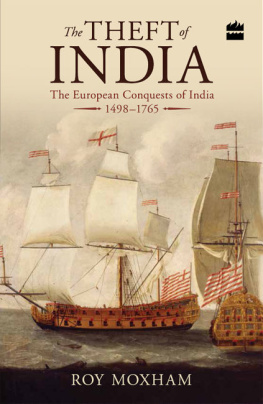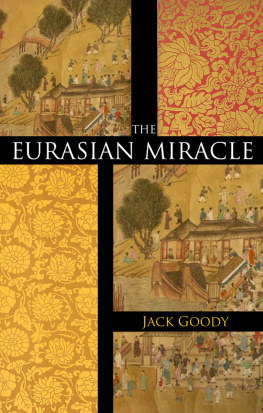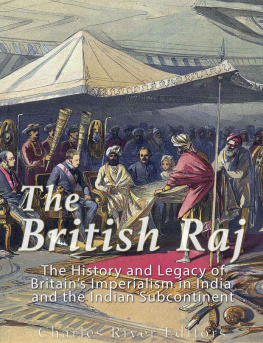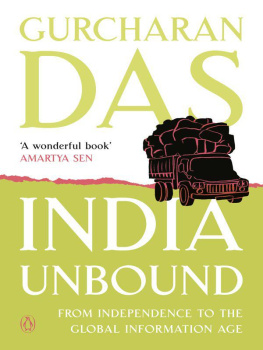
To my father
SIMON STUART
(19302002)
PLATES
SECTION ONE
SECTION TWO
Courtesy of Christian de Chefdebien
SECTION THREE
INTEGRATED
Stranded in the countryside and confronted with a live chicken which he has to roast, Withnail is paralysed. I think you should strangle it instantly, says his anxious friend Peter, in case it starts trying to make friends with us. I cant, he adds, those dreadful, beady eyes (Bruce Robinson, Withnail & I (1987)). In 1714 the philosophical wit, Bernard Mandeville, mused on a very similar predicament: I question whether ever any body so much as killed a Chicken without Reluctancy the first time, he commented wryly, yet all of them feed heartily and without Remorse on Beef, Mutton and Fowls when they are bought in the Market.
In the era preceding the Industrial Revolution the question of meat-eating was one of the fiercest battle-fronts in the struggle to define humanitys proper relationship with nature. The vital question: should humans be eating animals? was a serious challenge to Western societys belief that the world and everything in it had been made exclusively for mankind. Vegetarians called for a wholesale reappraisal of the human relationship with nature. Man was lord of the creation: but what kind of a lord, vegetarians asked, ate his own subjects?
It started with the Bible with the very first chapter of Genesis. The These two pillars of cultural authority provided a religious and philosophical sanction for humanitys predatory instincts (a characteristic of hominid behaviour which arose more than a million years ago). Anything that wasnt recognisably Homo sapiens stood little chance of being valued beyond its basic utility. But there were always counter-currents and cracks in the edifice, and it was into these fractures that vegetarians thrust their cultural crowbars.
Man was lord of the earth; but in what, exactly, did his dominion consist? In the beginning at least, according to the Bible, mans dominion over the animals apparently did not include killing them for the very next thing God had said to Adam and Eve was: Behold, I have given you every herb bearing seed and every tree, in the which is the fruit of a tree yielding seed; to you it shall be for meat (Genesis 1:29). From this primeval culinary instruction most seventeenth- and eighteenth-century theologians deduced that Adam and Eve were restricted to eating fruit and plants, and all creatures lived together in herbivorous peace. It was only much later (1,600 years by standard chronology), when the earth had been destroyed and wed again in Noahs Flood, that God altered the charter to mankind. When Noah came down from the Ark, God told him, the fear of you and the dread of you shall be upon every beast of the earth, and upon every fowl of the air, upon all that moveth upon the earth, and upon all the fishes of the sea; into your hand are they delivered. Every moving thing that liveth shall be meat for you; even as the green herb have I given you all things (Genesis 9:23). As the scholar John Edwards explained with relish in 1699, this was as much as to say, you have as free liberty now, since the Flood, to eat the Flesh of every living Creature, as you had before the Flood to feed on every sort of Herbs and Fruits, tho you were stinted as to Flesh. This is the clear sense and import of the words; and consequently proves, that eating Flesh before the Flood was unlawful.
The friction between Gods permission to prey upon animals and the ideal of mankind in harmony with creation produced a fault line which vegetarians sought to magnify. Even as the biblical strictures faded in society, equivalent values remained prevalent, and their legacy can still be traced in modern society, particularly in the deep-rooted beliefs on either side of the environmental debate.
Meat-eating came under fire from a spectacular array of viewpoints in the seventeenth and eighteenth centuries. Revolutionaries attacked the bloodthirsty luxury of mainstream culture; demographers accused the meat industry of wasting resources which could otherwise be used to feed people; anatomists claimed that human intestines were not equipped to digest meat, and travellers to the East presented India as a peaceful alternative to the rapacity of the West. Radicals and eccentrics contested their societys values head on; but many of the eras foremost thinkers also wrangled over the issues, leading to a reassessment of human nature. The luxury of choosing to abstain from meat may have been restricted to small sectors of European society, but these often drew their inspiration from the underfed poor who seemed to live, and labour, without needing vast quantities of meat. The cultural elites in turn influenced agronomic, medical and economic policies which determined the diets of populations as a whole.
The arguments that raged in the formative period between 1600 and 1830 helped to shape the values of modern society. Understanding the history of our ideas sets modern culture in a striking new light and can overturn our most entrenched assumptions. The early history of vegetarianism reveals how ancient ethics of abstinence, early medical science and Indian philosophy have influenced Western culture in profound and unexpected ways.
Returning to a state of harmony free from carnage became a fervent wish for many in the seventeenth century; it remained an idyllic dream even for those who recognised its impossibility. It was part of what can be called prelapsarianism: the desire to return to the perfection enjoyed by mankind before Adam and Eves lapse in Paradise. Prelapsarians often wished to reinstate the harmonious relationship with the animals enjoyed in Eden. Their dominion would be benevolent and kind, not a savage tyranny: an ideal which seventeenth-century radicals used in their attack on oppression and violence in human society.
In 1642 civil war broke out between Royalists and Parliamentarians, plunging England into years of bloodshed. Men and women of all political stripes searched for an alternative to the anarchy around them by trying to recreate a society based on paradisal peace and harmony. The Royalist Thomas Bushell followed his master Francis Bacons advice by testing whether the primeval diet was the key to long life and spiritual perfection. On the radical wing of the Parliamentary faction, puritanical fighters for democracy used vegetarianism to articulate their dissent from the luxurious mainstream, and called for a bloodless revolution to institute a slaughter-free society of equality. Religious extremists chimed in with the announcement that God dwelt within the creatures and mankind should therefore treat them all with love and kindness.
One other external force joined the fray, exerting a surprising influence on Western culture. European travellers to India discovered the ancient Indian religions and the fascinating doctrine of ahimsa, or non-violence to all living things. They interrogated Hindus and Jains on its philosophical ramifications; with astonishment, they observed animal hospitals, widespread vegetarianism and extraordinary kindness even to the most lowly creatures. News of Indian vegetarianism proved a radical challenge to Christian ideas of human dominance, and it contributed to a crisis in the European conscience. To many it seemed that the idealists dreams had become a reality. Vegetarians got down on their knees, calling on the ancient Indian philosophers to lead humanity away from its state of corruption and bloodshed.
Europes encounter with Indian vegetarianism had a massive impact well beyond the radical fringe. A thriving trade in travel literature inflamed the eager inquiries of serious philosophers and fuelled the curiosity of a wide popular audience. The travellers themselves tended to ridicule Indian vegetarianism as absurd soft-heartedness, but many readers saw in the Indian system a powerful and appealing moral code. Members of the philosophical establishment John Evelyn, Sir Thomas Browne and Sir William Temple recognised that the Indian vegetarians proved that people could live happily on the original fruit and vegetable diet. Sir Isaac Newtons reading about Eastern sages helped to convince him that Mercy to Beasts was one of Gods first and most fundamental laws from which Europeans had long since apostatized. Sceptics at the end of the seventeenth century used Indian vegetarianism to plant a powerful blow on European religious and social orthodoxies, arguing that Indians upheld the original law of nature: to do unto others (including animals) as you would be done by.
Next page
